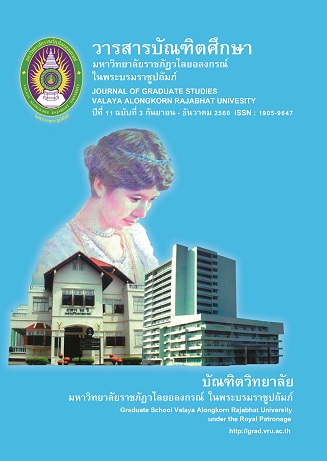การพัฒนาการคิดวิจารณญาณของนักศึกษาสาขาวิชาการศึกษาปฐมวัยโดยการจัดการเรียนรู้โดยใช้ปัญหาเป็นฐาน
Main Article Content
Abstract
บทคัดย่อ
การวิจัยเรื่อง การพัฒนาการคิดวิจารณญาณของนักศึกษาสาขาวิชาการศึกษาปฐมวัยโดยการจัดการเรียนรู้โดยใช้ปัญหาเป็นฐาน เป็นการวิจัยเชิงทดลอง มีวัตถุประสงค์ 1) เพื่อเปรียบเทียบการคิดวิจารณญาณและผลสัมฤทธิ์ทางการเรียนของนักศึกษาสาขาวิชาการศึกษาปฐมวัย ระหว่างก่อนและหลังได้รับการจัดการเรียนรู้โดยใช้ปัญหาเป็นฐาน 2) เพื่อเปรียบเทียบการคิดวิจารณญาณและผลสัมฤทธิ์ทางการเรียนของนักศึกษาสาขาวิชาการศึกษาปฐมวัย หลังการทดลองระหว่างกลุ่มทดลองที่ได้รับการจัดการเรียนรู้โดยใช้ปัญหาเป็นฐานกับกลุ่มที่ได้รับการจัดการเรียนรู้แบบปกติ 3) เพื่อศึกษาพัฒนาการของการคิดวิจารณญาณของนักศึกษาสาขาวิชาการศึกษาปฐมวัยของกลุ่มทดลองที่ได้รับการจัดการเรียนรู้โดยใช้ปัญหาเป็นฐาน กลุ่มตัวอย่างที่ใช้ในการวิจัยครั้งนี้เป็นนักศึกษา สาขาวิชาการศึกษาปฐมวัย ชั้นปีที่ 4 คณะครุศาสตร์ มหาวิทยาลัยราชภัฏวไลยอลงกรณ์ ในพระบรมราชูปถัมภ์ จำนวน 2 หมู่เรียน แบ่งเป็นกลุ่มทดลองซึ่งได้รับการจัดการเรียนรู้ในรายวิชากระบวนการจัดการเรียนรู้สำหรับเด็กปฐมวัยโดยใช้ปัญหาเป็นฐาน และกลุ่มควบคุมซึ่งได้รับการจัดการเรียนรู้ในรายวิชากระบวนการจัดการเรียนรู้สำหรับเด็กปฐมวัยแบบปกติ เครื่องมือที่ใช้ในการวิจัย คือ แบบสัมภาษณ์ แผนการจัดการเรียนรู้ แบบวัดการคิดอย่างมีวิจารณญาณ และแบบวัดผลสัมฤทธิ์ทางการเรียน และวิเคราะห์ข้อมูลการทดสอบสมมุติฐานด้วยสถิติทดสอบค่าที และค่าเอฟโดยใช้การวิเคราะห์ความแปรปรวนทางเดียวแบบวัดซ้ำ (One-way ANOVA with Repeated Measures)
ผลการวิจัยสรุปได้ดังนี้
- คะแนนความสามารถทางการคิดวิจารณญาณของนักศึกษา ที่ได้รับการจัดการเรียนรู้โดยใช้ปัญหาเป็นฐานมีคะแนนเฉลี่ยหลังเรียน เท่ากับ 37.16 สูงกว่าก่อนเรียน เท่ากับ 23.20 และผลสัมฤทธิ์ทางการเรียนมีคะแนนเฉลี่ยหลังเรียน เท่ากับ 28.52 แตกต่างกับ ก่อนได้รับการจัดการเรียนรู้โดยใช้ปัญหาเป็นฐาน อย่างมีนัยสำคัญที่ระดับ .01
- คะแนนความสามารถทางการคิดวิจารณญาณและผลสัมฤทธิ์ทางการเรียนหลังเรียนของนักศึกษากลุ่มทดลองหลังการเรียน สูงกว่ากลุ่มควบคุมอย่างมีนัยสำคัญทางสถิติที่ระดับ .01
- คะแนนพัฒนาการของการคิดวิจารณญาณของนักศึกษา ของกลุ่มทดลองที่ได้รับการจัดการเรียนรู้โดยใช้ปัญหาเป็นฐาน จำนวน 3 ครั้ง โดยครั้งที่ 3 มากกว่าครั้งที่ 1 และครั้งที่ 2 อย่างมีนัยสำคัญทางสถิติที่ระดับ .01 แสดงให้เห็นว่ากลุ่มตัวอย่างที่ได้รับการจัดการเรียนรู้โดยใช้ปัญหาเป็นฐานอย่างต่อเนื่องจะมีการคิดวิจารณญาณสูงขึ้น
ABSTARCT
The development for Critical Thinking of Students in Early Childhood Education Program by Using Problem–based Learning is an experimental research, which has purposes to: 1) Compare the critical thinking and academic achievement of the students before and after the learning process by using problem-based learning, 2) Compare the critical thinking and academic achievement of the students after performing an experiment between the experiment group who has been taught by using problem-based learning and a regular group who has been taught by a normal learning process, and 3) Study the development of critical thinking of the students in the experimental group who has been taught by using problem-based learning. The experiment groups used in this research is the 4th year students in Early Childhood Education Program, Faculty of Education, Valaya Alongkorn Rajabhat University, which consists of two groups; the experiment group who has been taught in “Learning and Experience Process for Young Children” course by using a problem- based learning, and the regular group who has been taught the normal learning process. The tools used in research are interview form, lesson plan, critical thinking form, and learning achievement form. And the hypothesis testing was performed by T-test, and F-test using One-way repeated using ANOVA.
The results are as follows
- The scores of critical thinking ability of the students who has been taughtby the problem-based learning is average to 37.16, which is higher than before performs learning process that is equal to 23.20. And the academic achievement score after learning process is average to 28.52, which the differences between before and after learning process using the problem-based learning is significantly at .01
- The score of critical thinking ability and academic achievement of the students after learning process in the experimental group are higher than those in the control group at statistically significant .01
- An improvement of critical thinking scores of students in the experiment group, who has been taught in by using a problem - based learning 3 times are by which the 3rd time is greater than the 1st time and the 2rd time with statistically significant at .01. The result shows that the experiment group who have been continuously arranged by using problem - based learning would have a higher critical thinking.
Article Details

This work is licensed under a Creative Commons Attribution-NonCommercial-NoDerivatives 4.0 International License.
บทความทุกเรื่องได้รับการตรวจความถูกต้องทางวิชาการโดยผู้ทรงคุณวุฒิ ทรรศนะและข้อคิดเห็นในบทความ Journal of Global of Perspectives in Humanities and Social Sciences (J-GPHSS) มิใช่เป็นทรรศนะและความคิดของผู้จัดทำจึงมิใช่ความรับผิดชอบของบัณฑิตวิทยาลัย มหาวิทยาลัยราชภัฏวไลยอลงกรณ์ ในพระบรมราชูปถัมภ์ กองบรรณาธิการไม่สงวนสิทธิ์การคัดลอก แต่ให้อ้างอิงแหล่งที่มา


